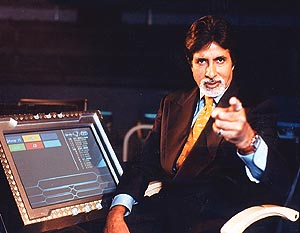Giving an Answer Back
Ever since Dan Brown’s bestseller has been released, there have been at least few responses. One, which says that it’s a cultural product that must be engaged. There are allegations made in the book about Jesus and the Bible, which must be responded to. Another, which insists that it’s best to ignore it since it’s a work of fiction and really does not merit attention. Among those who adopt the second position have been many Christians who think that these “challenges to the faith” will not stand the test of time anyway. By Ajoy Varghese.
“With all my admiration and love for democracy, I’m not prepared to accept the statement that the largest number of people are always right” – Jawahar Lal Nehru
It’s a little too late to say that The Da Vinci Code “double” is making waves all over the world. It’s very rare that we hear about a story that is based on a “religious” figure that has become the topic of popular debate and discussion in urban centers across the world. That may be because religious figures are often granted immunity from critique that would apply to ordinary mortals.
Or it may be that sensitivities about these matters are high, as the Danish cartoons have revealed yet again what we already knew – that for many people humor is blasphemy if there is such a thing as even a hint of irreverence. It could also be that in a postmodern secularized public discourse religious figures don’t qualify to contribute.
Yet, bucking the trend is Jesus who continues to be a favorite subject for regular controversy, even in a largely irreligious Hollywood. Mel Gibson’s The Passion of the Christ and Dan Brown’s the Da Vinci Code are but two typical and contradictory approaches to the same subject – the 2000 year old story of a mysterious Jewish carpenter. Which version of Jesus is the right one or whether it is possible at all to arrive at the truer picture of Jesus from history continues to be debated both in academia and at kitchen tables and theater halls.
Ever since Dan Brown’s bestseller has been released, there have been at least few responses. One, which says that it’s a cultural product that must be engaged. There are allegations made in the book about Jesus and the Bible, which must be responded to. Another, which insists that it’s best to ignore it since it’s a work of fiction and really does not merit attention. Among those who adopt the second position have been many Christians who think that these “challenges to the faith” will not stand the test of time anyway. The third category would want both the book and the recent movie (which is based on the book) banned a la The Satanic Verses. And surprisingly, India is among the few countries where some of its states have banned the book.
The church as a pressure group in India has arrived. I am unabashedly of the opinion that we must engage the book, which is a thinly veiled good-looking advertisement for ancient paganism turned neo. We live in times that borrow its foundational truths from latest intellectual and cultural trends. Movies like the Matrix and Star Wars have played John the Baptist to the resurgence of Gnostic heresies across the Western world. The more popular voices like Dan Brown or Deepak Chopra are contemporary prophets of the laissez-faire spirituality. Here there is no test or qualification for the prophetic office, except popularity. And of course, it should be neo.
Over the last two years, my friends and I have made many presentations on the DVC in universities, book clubs, churches and various other settings. It is mind boggling to see how many questions; doubts and confusions lie beneath the surface tucked away in the heart of both the avid churchgoer as well as the disinterested one. People of other faiths have been particularly curious as well.
Brown may have done the church a favor to provoke it to rediscover the Jesus of the Scriptures and of history. And he may not always look like the Jesus of the devout churchgoer. Dorothy Sayers points out what has happened: ”The church has. …very efficiently pared the claws of the Lion of Judah, certified him as a fitting household pet for pale curates and pious old ladies”. For those who prefer to argue that it is “just fiction”, I would suggest that they have misunderstand the nature of contemporary fiction and its powerful role in shaping our culture and its plausibility structure today.
Since the nature of reality and truth is being intensely debated even to the extent of arguing that its an epistemic dead end, most people have turned to fiction which has the privilege of blending fact and fancy together. In fiction, the known laws of the “real world” need not apply. In fiction as in dreams, tables need not have sharp corners (C.S. Lewis revised!).
Is it any wonder then that fantasy and fiction movies like The Matrix, The Star Wars series, The Lord of the Rings and the Chronicles of Narnia have dominated public discussion over the last few years? The Sri Lankan writer Romesh Gunashekara in one of his latest interviews throws light on this issue: “Of course, imaginative journeys grow out of specific places like a plant in a garden. The two are linked but should not be confused for each other.
For me, the strength of fiction is in the reality of its invented world. A novel has to create world and cannot simply rely on the real place for sustenance. Sometimes, it’s the real place that gains sustenance from the fictional. But it’s a complicated relationship”. (Literary Review, The Hindu, May 7th ’06).
In popular discourse, fact and fiction are intertwined and Dan Brown knows exactly how to leverage the power of this relationship. That is why he starts his book with a page titled “fact” and then begins his journey in fiction. The hangover of the first page of the book is hard to shake off and by the time we have finished reading the book, we don’t know whether Brown intended for the book to be taken as fact or fiction.
Even for his movie, the disclaimer from Sony was that “all characters in the movie are fictitious”. Leads the novice to wonder whether everything else in the movie is true! Some devout Christians choose the option of staying away from the discussion. However, its not easy to do so especially if you are in the habit of talking about Jesus and his continued relevance to humankind. Any one who talks about Jesus today particularly in an urban setting runs into questions about the nature of Christ, the reliability of the Bible, the role of the church etc.
Questions call for answers and not for antagonism or escapism. If we choose to flee the arenas of debate, dialogue and engagement, I think runs contrary to the role that Christ had in mind for his disciples – the salt of the earth and the light of the world. Salt add taste by getting submerged in the food and identifying with it. Light dispels darkness by shining brightly. This can lead to the “works of darkness” being exposed and corrected.
The disciples share a paradoxical relationship with the world in which they live. They are “in the world but not of it”. The disciple in every generation has to contextualize the message and the messenger but he may also have to confront that which is evil. That is at the heart of honest cultural engagement – the identification and the confrontation. Isn’t that what the incarnation is all about? And do we have any other pattern to follow? So I think that while we may not go along with the tide always, copping out of the discussion does not seem to be a legitimate option.
Whether we want to
read the book and watch the movie is a personal choice. Engaging our world and transforming it in the process is a personal and corporate responsibility for the church. I would think that the DVC products offer a great opportunity for connecting with our world. Brown’s great success story is but an indication that the themes and persons addressed in his book matter to our people, both young and old. In other words, the question that Jesus asked his core group of disciples still challenges many: “Who do you say that I am?”
For those who think that the book and the movie should be banned in India, I realize that in some areas it may cause religious unrest and for the sake of public order and safety, it may be a legitimate response. However, if the rationale is that the adult readers and movie goers will be led astray in their understanding of Jesus, I wonder why the church has not informed the public understanding of Jesus so far.
The fact of the matter is that the church has often spoken only when its interests have been affected. In doing so the church has not behaved like the church – the Assembly of the God who is the God of the nations and all peoples. The church’s voice must not be heard for itself primarily but for others, including for the rights of people of other faiths to live fully and freely as people created in the image of God.
Another danger in the church becoming a pressure group is that it becomes a tool in the hands of power mongers who will extract their pound of flesh at the opportune time – whether its in the form of votes or something else. Besides, this is a double-edged sword. If we argue that this movie is causing civil unrest, it can also be invoked tomorrow to argue that conversions to Christianity are causing civil unrest and hence must be banned. After all, it’s the freedom of expression in both cases, isn’t it? Every move to limit someone else’s freedom, (even if it is being used scandalously but within the laws of the land), simply provides the opponents of the church more ammunition to fire at her.
The followers of Christ have the responsibility of not just explaining the what of their belief but also the why. Not only the why but also whom. And these are related – The objective truth, the intellectual rationale and the continual personal encounter are like the three angles of a triangle, which encases belief and protects it as it continues to mature. In a culture of radical doubt, is it surprising that radical beliefs can finally be cherished and enjoyed only if it is anchored in a deep and intimate relationship. Years ago, Simon and Garfunkel insightfully sang: “So you see I’ve come to doubt All I once held was true I stand alone without beliefThe only truth I know is you – Kathy’s Song.
{moscomment}






